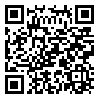BibTeX | RIS | EndNote | Medlars | ProCite | Reference Manager | RefWorks
Send citation to:
URL: http://mjiri.iums.ac.ir/article-1-195-en.html

 , Mohammad R Vaez-Mahdavi
, Mohammad R Vaez-Mahdavi 
 , Soghrat Faghihzadeh
, Soghrat Faghihzadeh 
 , Ali Montazeri
, Ali Montazeri 
 , Ali A Farshad
, Ali A Farshad 
 , Nasser Kalantari
, Nasser Kalantari 
 , Ali Maher
, Ali Maher 
 , Mohammad M Golmakani
, Mohammad M Golmakani 
 , Gholam H Salehi
, Gholam H Salehi 
 , S. Abbas Motevallian
, S. Abbas Motevallian 
 , Hossein Malek-Afzali
, Hossein Malek-Afzali 

Abstract
Background: Inequalities in health are ever increasing among different communities
of either affluent or disadvantaged especially in urban areas. To identify and address inequalities in health and its determinants among societies, urban health equity assessment and response tool (Urban HEART) in four 'policy domains' related to social determinants of health, has been developed by WHO Kobe Centre (WKC) and piloted in several countries. The tool was extended to six policy domains in Tehran and the number of indicators was doubled. This paper describes the concept of Urban HEART, its development, study protocol and pilot implementation in Tehran.
Methods/Design: Sixty five indicators in 6 domains related to inequalities in health
and social determinants of health (SDH) namely 'physical and infrastructure', 'human and social', 'economic', 'governance', 'health', and 'nutrition', were developed and approved in an international workshop held in Tehran in April 2008. Acomprehensive questionnaire with 12 sections was developed to be administered in a large population based survey in Tehran.
Discussion: This is the first report of urban health equity assessment and response tool (Urban HEART) project which was conducted in Tehran. Year 2010 has been devoted to 'Urbanisation and Health' by the World Health Organisation, when 1000 cities are supposed to join a global plan to raise health in the urban areas. The Urban HEART project is supposed to play an important role henceforth.
| Rights and permissions | |
 |
This work is licensed under a Creative Commons Attribution-NonCommercial 4.0 International License. |



